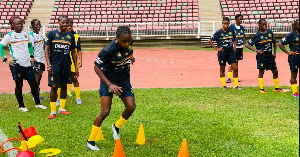Some of Africa’s most entrenched leaders are facing an unprecedented challenge from an unexpected foe: falling oil prices.
Rulers of a cluster of nations along Africa’s oil-rich Atlantic coast have long used crude revenue to consolidate their power, reward political allies and subsidize basic goods and services.
As oil prices decline, that formula for maintaining power looks increasingly inadequate for rulers such as Angola’s José Eduardo dos Santos.
“If the drop in prices continues, he will be in free fall,” said Ricardo Soares de Oliveira, a political scientist at the University of Oxford.
For more than 30 years in office, Mr. dos Santos has relied on the proceeds from oil sales. If that revenue continues to shrink, “the very assumption that this regime is able to weather all sorts of storms would be in question,” Mr. de Oliveira said.
Officials in Angola didn’t respond to requests seeking comment on how dropping oil prices would affect the government.
Earnings from the 1.7 million barrels produced daily by Angola, sub-Saharan Africa’s second-biggest crude producer, have given it a comfortable trade surplus and 5.3% annual growth each year since the global financial crisis in 2009.
Mr. dos Santos has used the windfall to mute opposition to his autocratic style of government.
He has doubled the public-wage budget, spent $5 billion a year on subsidies that hold down gasoline prices and directed billions of dollars to a sovereign-wealth fund that is officially charged with investing in efforts to diversify Angola’s economy. It is run by one of his children, José Filomeno de Sousa dos Santos.
Such largess now appears unsustainable. The country’s economy could shrink in 2015 for the first time in two decades, according to London-based Capital Economics.
José Miranda, a manager for Australia-based engineering contractor Aurecon Group, said Angola’s government has cut spending so drastically that his contracts for water and road projects there are down by a third this year.
The same tensions are reverberating across the continent.
Fitch Ratings warned in December that Cameroon and Gabon also will face a fiscal crunch next year as oil prices drop.
Oil receipts pay for a quarter of the national budget in Cameroon, where Paul Biya has ruled for more than three decades. Gabon, ruled since 1967 by Omar Bongo, then his son Ali Bongo Ondimba, draws more than half its budget and most of its export revenue from oil.
Plunging oil prices will also test the grip of Africa’s longest-serving leader, Teodoro Obiang, who has ruled Equatorial Guinea since 1979. The country of some 722,000 people is Africa’s richest by per capita, yet the World Bank says 80% of the population lives on less than $2 a day.
Even as most in his country remain mired in poverty, Mr. Obiang’s son—one of his two vice presidents and presumed successor—reached an out-of-court settlement in October with the U.S. Department of Justice in a civil suit accusing him of amassing more than $300 million of assets through corruption and money laundering.
In a statement announcing the settlement, Assistant Attorney General Leslie Caldwell said Teodoro Obiang carried out a “corruption-fueled spending spree” in the U.S. using funds gained through “relentless embezzlement and extortion” of Equatorial Guinea’s government and businesses.
The president has built a gleaming conference center and seldom-used six-lane highways in Malabo, Equatorial Guinea’s capital. Now, he is relocating the capital to the outskirts of the village in the rain forest where he was born, complete with an opera house, golf courses and a five-star hotel.
The International Monetary Fund has urged him to curtail those plans as demand for Equatorial Guinea’s crude by its biggest customer—the U.S.—shrinks because of shale production there.
The country’s economy slipped into recession last year and could contract 8% next year, as demand from the U.S. continues to fall.
If so, it would be the worst growth rate since “the time of lean cows” more than 30 years ago. That era of brutal repression and starvation led Mr. Obiang to seize power from his uncle and the president, Francisco Macias, and put him on trial on charges of genocide and other offenses.
After his conviction by a military tribunal, Mr. Macias was sentenced to death and executed by firing squad.
Infos Business of Saturday, 3 January 2015
Source: Wall Street Journal













